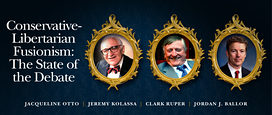It would be abhorrent and wrong to strip away the ideological identity of libertarians and force them to comply with a dominant conservative agenda. Even in the name of presenting “one complete and harmonious whole,” to use Jeremy Kolassa’s critical words. Which is exactly why that is neither the type of fusionism I support nor the one for which I argued in my previous essay. Clark Ruper does an excellent job of articulating the history of fusionism from the 1960 to the present, and I agree with his diagnosis of why that model of fusionism does not work today.
That is why I proposed that “the way forward for fusionism is to celebrate the moral superiority of free markets and limited government and do a better job of making those moral arguments to religious conservatives.” This seems like the “ad hoc coalitions on certain issues” that Kolassa says he could support. This approach specifically celebrates free markets and appeals to the skills at which libertarians have proven to excel—teaching free market economics to young people.
I repeat that I do not know the place of fusionism in all areas, social issues chief among them. When I earlier made that point, I was agreeing that fusionism need not be what Ruper calls “a formal alliance,” as it was understood to be in the past. Operating under the assumption that I was making the opposite case, Kolassa seems to be countering by arguing for a type of libertarian purism in which the tenets of libertarianism are already determined, and you are not welcome to consider yourself a libertarian unless you pledge fidelity to all of the points of faith.
In my experience, there is still a vibrant discussion going on amongst libertarians, Objectivists, and other free-market capitalists on the very social issues that Kolassa brings into the debate. There is no reason, other than the sectarianism mentioned by Jordan Ballor, to argue that one cannot believe in free market capitalism if they do not agree with the Cato Institute, or Ayn Rand, or whoever else is your chosen ideological standard bearer on issues of gay marriage, drug legalization, civil liberties, feminism, foreign policy, or immigration.
More so than the libertarian purists, I believe that libertarians can and should find areas of commonality with other ideologies. I argued at length that an important area for this is in reaching out to the religious conservatives and making a case for the benefits that free market capitalism affords the poor.
While I agree with Kolassa and Ruper that if we discover areas of commonality with the left, we should exploit them, I would caution those looking for these areas to temper their exuberance. As I wrote previously, a difference in worldview divides conservatives and libertarians on one side and liberals on the other. Conservatives and libertarians have ideologies based on learning the lessons of history and improving and perfecting our attempts at governing a free people, whereas liberals do not believe we “stand on the shoulders of giants.” Any areas of commonality with them would be isolated and auxiliary, not leading to any long-term partnership.
Kolassa took particular issue with the assertion that conservatives and libertarians share an ideological ancestry. He writes, “as the name suggests, libertarianism is about liberty, specifically individual liberty. Conservatism, on the other hand, is about conserving as much of the past as possible, and having as little change as possible.” This definition of conservatism is in stark juxtaposition to what conservatism actually is, which is to learn from the mistakes of the past and prevent them in the future. A rather optimistic and forward-looking approach if properly understood.
Ruper concludes, “my argument is for building our own libertarian movement with our own institutions, centered on a youthful and forward-looking libertarian brand.” Interestingly, Kolassa also mentions the need for “a fully independent brand” for libertarianism. One of the most fascinating insights I have learned in studying marketing is that an effective brand is not only distinct and recognizable, but permeating. An effective brand becomes a subconscious element of a person’s life because the brand represents the entire social context with which that person identifies. A successful brand strategy for libertarianism requires a constant flow of the ideas of freedom into a person’s life, where it is not abrasive, but rather something that can—through persistence—be absorbed into a person’s ideology.
Russell Roberts, now of the Hoover Institution, and one of the greatest modern communicators of free market economics, is said to have called this phenomenon “drops on rocks” in a speech to the Koch Associates Program: One drop on a rock won’t do anything. Two drops on a rock won’t do anything. One thousand drops on a rock still won’t do anything, but millions and millions of tiny drops on a rock will eventually split the rock. If we want to make the world more free, we have to understand that even our best efforts are like drops on the rocks of people’s lives.
Our goal should be to create as many drops as possible to make a brand for libertarianism that will permeate society so effectively that we see massive political change in the direction of freedom. This cannot be accomplished by libertarian purism. It must be accomplished by fusionism, even if only in limited areas, by those who share a forward-looking ideology.

